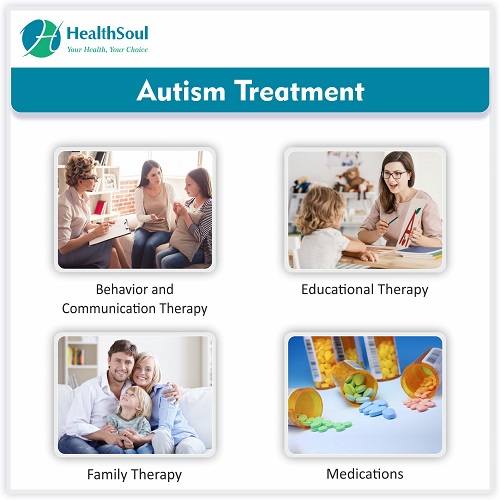Autism: Risk Factors and Treatment

Autism or Autism Spectrum Disorder (ASD) refers to a condition marked by abnormalities in an individual’s social behaviour and communication. This occurs due to a developmental abnormality in the brain leading to problems in perceiving and responding socially to others around them.
The reason for using the term ‘Autism Spectrum Disorder’ is to highlight that this can present in several ways with a wide ranging set of behavioural patterns. The symptoms of autism are generally noticed in the first 2 year of life and the American Academy of Pediatrics recommends that all children be screened for autism.
The exact cause for ASD remains uncertain. Research suggests that ASD occur due to a combination of genetic and environmental factors. It is important to note that despite some claims, it has been definitively proven that vaccines do not have any association with ASD. Restricting a child from getting vaccinated puts them at risk for potentially fatal illnesses like measles, mumps, diphtheria and Whooping cough.
Risk factors for ASD
While ASD occurs in all races, ethnicities, nationalities and ethnic groups, some factors have been found to increase the risk of the condition.
- Male sex of the child: Boys are four times more likely than girls to develop ASD. The reasons are unknown.
- Family history of ASD: Having a sibling with ASD. Mild abnormalities in social behaviour and communication may be present in the parents as well.
- Older age of parents
- Very low birth weight and preterm babies
- Presence of other disorders: Down syndrome, fragile X syndrome, and Rett syndrome are examples of a few diseases which may manifest with ASD

Symptoms of ASD
There are no definitive patterns of symptoms which can be observed in all individuals with ASD. Each individual presents across a wide spectrum. Some may have a severe functional disability while others may have minimal problems. Many have decreased intelligence with difficulty learning new information, while some have normal to high intelligence.
In general, some of the common symptoms described in ASD are as follows

Abnormal behavior in social communication and interactions
- Poor eye contact and limited facial expressions
- Failure to respond when being called by name
- Impression of not paying attention when being addressed or spoken to
- Preference for playing on their own and appears to be in their own world
- Resistance to being shown affection by cuddling, kissing or holding
- Poor speech or delayed speech with a flat tone of voice
- Does not show interest in showing favorite toys or objects to others
- Repetition of words or phrases verbatim without context or knowledge of the meaning
- Difficulty with maintaining a back and forth conversation
- Difficulty in understanding others’ point of view
Abnormal patterns of behavior
- Performing repetitive activities like hand flapping, rocking or spinning, with increased agitation if attempts are made to stop.
- Agitated and self-harming behaviors like headbanging.
- Performance of several strict rituals and compulsive behaviors with a disturbance at any change
- Abnormal levels of intense focus on certain objects or aspects of objects without an understanding of the actual purpose of the same
- Increased sensitivity to external sensory stimuli such as light, sounds or touch
- Intense interest in certain topics like cars, facts or numbers
Symptoms of other mental disorders
- Anxiety
- Attention Deficit Hyperactivity Disorder (ADHD)
- Depression
Diagnosis of ASD
The potential for varied severity in the presentation of ASD poses a challenge to an effective diagnosis of this condition. Current recommendations are for pediatricians to screen all children under their care for developmental and behavioral abnormalities at regular intervals during well-child examinations.
Suspicion of ASD is then referred for further evaluation by a pediatric neurologist, child psychiatrist or psychologist.
- The Diagnostic and Statistical Manual of Mental Disorders (DSM-5) has criteria for diagnosis
- Difficulty with communication and interaction with other people
- Restricted interests and repetitive behaviors
- Symptoms that hurt the person’s ability to function properly in school, work, and other areas of life
- Test for hearing, speech, and vision as abnormality in any of these are other reasons for developmental delays
- Genetic testing for relevant disorders
Treatment of ASD
There is, unfortunately, no definitive way to treat or cure ASD. Several methods are followed to manage this condition and the exact management plan is tailored to suit the individual to aid in maximizing functional status. Generally, this involves a multi-disciplinary team and requires time and patience.
The various treatment options include the following
- Behavior and Communication therapy: Structured programs to improve social skills
- Education therapy: intense educational environments to improve skills and learning
- Family therapy: involving parents to teach them effective ways to interact, play and teach their children
- Occupational therapy: these are for training and teaching social skills required for daily living and independent functioning
- Medications: some drugs may be helpful in decreasing hyper activeness, anxiety and agitation in the individual with ASD

Prognosis of ASD
With increasing age, milder form of ASD may show improvement and individuals manage to merge with their peers to live normal lives. However, the majority with severe functional disability and those with intellectual disability face many problems further down the line. Adolescence tends to bring about many new challenges and emotional difficulties as well. Early, effective therapy may offer results in equipping individuals to live an independent life.
References
- Autism spectrum disorder (ASD). Centers for Disease Control and Prevention. Accessed April 11, 2019.
- Taylor LE, et al. Vaccines are not associated with autism: An evidence-based meta-analysis of case-control and cohort studies. Vaccine. 2014;32:3623
- Autism spectrum disorder. In: Diagnostic and Statistical Manual of Mental Disorders DSM-5. 5th ed. Arlington, Va.: American Psychiatric Association; 2013. Accessed April 11, 2019

